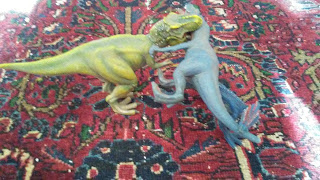It's no surprise that this is the largest category of books I'm recommending. It's what I like to read. I'm a classic sort of person, I suppose, for better or worse.
The Wind in the Willows by Kenneth Grahame--I have never read this one, but we got a copy from the MiL's friend (thanks, Mary!) and one of my boys has already read it twice. It's about as classic as it gets, and a very gentle sort of story with lots of friendships. It is, however, an old children's book, originally published in 1908, and is a perfect example of the ways in which children's fiction has changed. The sentences are long, with lots of punctuation, so only a quite proficient reader won't get lost in them. Also, the vocabulary is extraordinary, and I would venture to guess that modern adult readers wouldn't know what some of the words mean. So, it is a wonderful book to read aloud with a child who is not yet a very good reader, or a good book for a good young reader who is not yet brainwashed by Captain Underpants.
Lassie Come-Home by Eric Knight--Another animal book. This one has been read a few times by the other boy, who is a big fan of dog stories. There are other Lassie books, I think inspired by the popular television series, but this is the original, and the only one written by this author. If you have children sensitive to animals' distress, this one might have some disturbing parts to it, because of course attitudes to animals were very different when this book was written in 1940. Also, it has some vernacular speech in it, so it's probably best for stronger readers.
Charlie and the Chocolate Factory by Roald Dahl--What kid wouldn't want to visit Willy Wonka's chocolate factory? I'm not a huge fan of all of Roald Dahl's stories, but this is a great one. And, of course, there's also the fun of getting to watch the movie after reading the book. But ONLY the one with Gene Wilder as Willy Wonka. I cannot countenance Johnny Depp as the creepiest Willy Wonka ever. (I've never actually seen that one--I couldn't get past how strange Willy Wonka looked in the ads for it when it came out.)
Roll of Thunder, Hear My Cry by Mildred D. Taylor--This is a hard book for kids, I will not lie. It doesn't shy away from describing how difficult life in the segregated deep south was for black people for generations. But there is no denying the truth of it, and this book is very powerfully written. It also has great female characters in it: Cassie, Mama, and Big Ma are all what would now be termed "strong women." And in the tradition of "strong women" of the past, their strength is all directed to keeping their families and communities safe and thriving.
Sarah, Plain and Tall by Patricia MacLachlan--I recently re-read this book, which I remembered liking as a child. It's written in such simple language that I think it would qualify as a beginning reader's chapter book, but the simple language (and happy ending) does not mean it's a shallow story with shallow characters. It's told from a child's point of view, and I think does a good job representing how children grapple with some pretty heavy things (death, resentment, fear).
Four-Story Mistake by Elizabeth Enright--I found this book in our school library when I was cataloging everything. I had never heard of this author before, but I loved the book. Remember when I said that I think fantasy is such a popular genre now because it allows for safe children's stories with adventure? Well, this book (published in 1942) has very real children who had adventures simply because children at that time were still given the unsupervised time to have adventures of their own. The adventures in this book start when the family moves from New York City to the country. This is the second of what is referred to as "The Melendy Quartet," (the family's name is Melendy), and there were new editions of all four of the books published in 2008.
The Railway Children by Edith Nesbit--Another book about children who move to the country, but this one has a bit of a darker side, as the children have to move because their father is taken away. The children have all sorts of adventures in their new home, but there is the sadness and mystery of what happened to their father. It does have a happy ending, though.
Okay, I'll stop here. Do you have any more to add to this additional list of classic elementary fiction?








.jpg)

